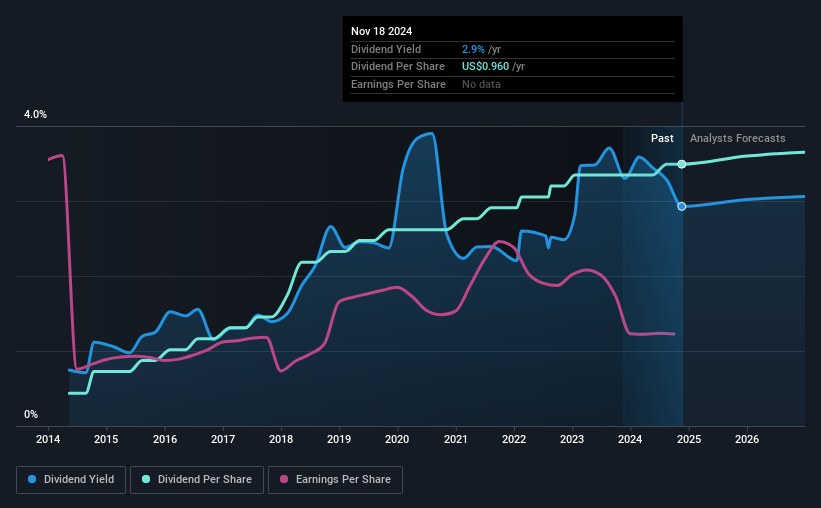
United Community Banks, Inc. (NYSE:UCB) has announced that it will pay a dividend of $0.24 per share on the 6th of January. Based on this payment, the dividend yield will be 2.9%, which is fairly typical for the industry.
See our latest analysis for United Community Banks
United Community Banks' Earnings Will Easily Cover The Distributions
While it is always good to see a solid dividend yield, we should also consider whether the payment is feasible.
United Community Banks has established itself as a dividend paying company with over 10 years history of distributing earnings to shareholders. Taking data from its last earnings report, calculating for the company's payout ratio shows 61%, which means that United Community Banks would be able to pay its last dividend without pressure on the balance sheet.
Looking forward, EPS is forecast to rise by 69.8% over the next 3 years. Analysts estimate the future payout ratio will be 40% over the same time period, which is in the range that makes us comfortable with the sustainability of the dividend.

United Community Banks Has A Solid Track Record
The company has been paying a dividend for a long time, and it has been quite stable which gives us confidence in the future dividend potential. Since 2014, the dividend has gone from $0.12 total annually to $0.96. This works out to be a compound annual growth rate (CAGR) of approximately 23% a year over that time. It is good to see that there has been strong dividend growth, and that there haven't been any cuts for a long time.
Dividend Growth May Be Hard To Come By
Some investors will be chomping at the bit to buy some of the company's stock based on its dividend history. However, things aren't all that rosy. Over the past five years, it looks as though United Community Banks' EPS has declined at around 7.4% a year. Declining earnings will inevitably lead to the company paying a lower dividend in line with lower profits. However, the next year is actually looking up, with earnings set to rise. We would just wait until it becomes a pattern before getting too excited.
In Summary
Overall, a consistent dividend is a good thing, and we think that United Community Banks has the ability to continue this into the future. With shrinking earnings, the company may see some issues maintaining the dividend even though they look pretty sustainable for now. This looks like it could be a good dividend stock going forward, but we would note that the payout ratio has been at higher levels in the past so it could happen again.
Investors generally tend to favour companies with a consistent, stable dividend policy as opposed to those operating an irregular one. However, there are other things to consider for investors when analysing stock performance. Taking the debate a bit further, we've identified 1 warning sign for United Community Banks that investors need to be conscious of moving forward. Looking for more high-yielding dividend ideas? Try our collection of strong dividend payers.
New: AI Stock Screener & Alerts
Our new AI Stock Screener scans the market every day to uncover opportunities.
• Dividend Powerhouses (3%+ Yield)
• Undervalued Small Caps with Insider Buying
• High growth Tech and AI Companies
Or build your own from over 50 metrics.
Have feedback on this article? Concerned about the content? Get in touch with us directly. Alternatively, email editorial-team (at) simplywallst.com.
This article by Simply Wall St is general in nature. We provide commentary based on historical data and analyst forecasts only using an unbiased methodology and our articles are not intended to be financial advice. It does not constitute a recommendation to buy or sell any stock, and does not take account of your objectives, or your financial situation. We aim to bring you long-term focused analysis driven by fundamental data. Note that our analysis may not factor in the latest price-sensitive company announcements or qualitative material. Simply Wall St has no position in any stocks mentioned.
About NYSE:UCB
United Community Banks
Operates as the bank holding company for United Community Bank that provides financial products and services to commercial, retail, government, education, energy, health care, and real estate sectors in the United States.
Flawless balance sheet with solid track record and pays a dividend.
Similar Companies
Market Insights
Community Narratives



